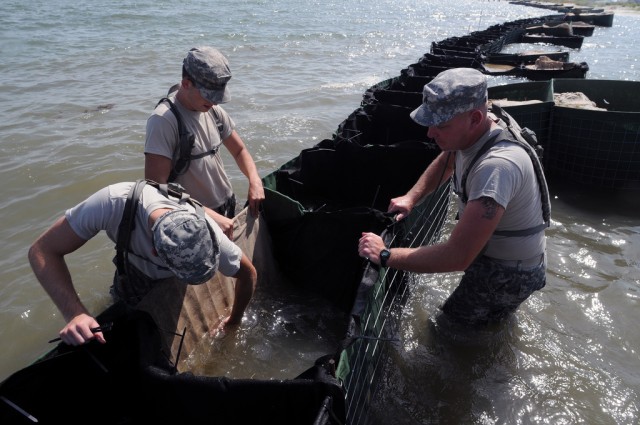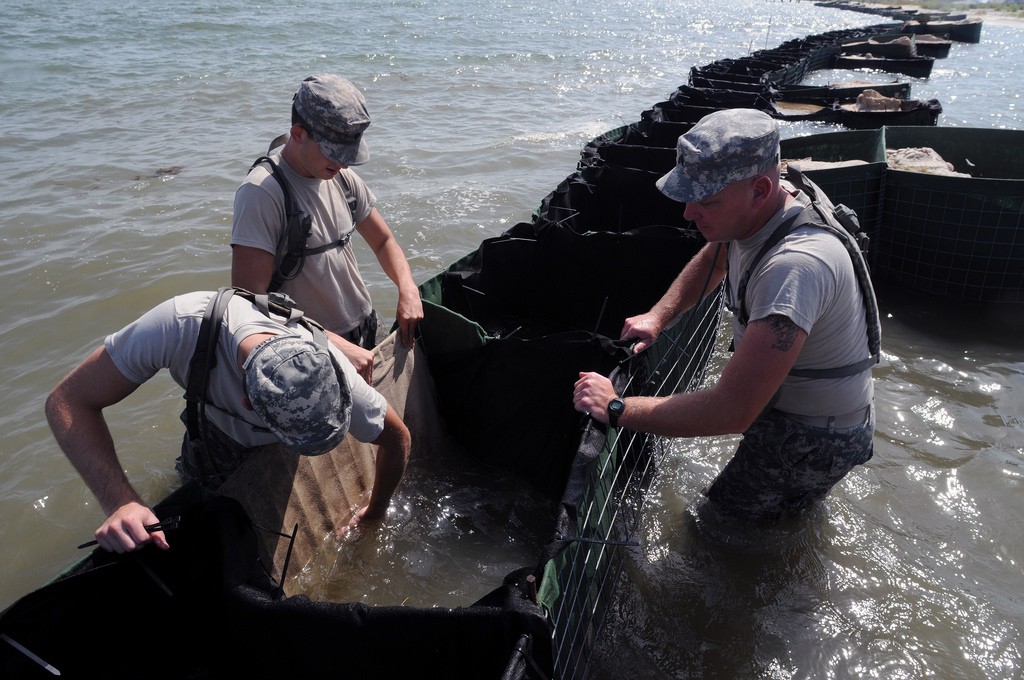
MOBILE, Ala. (July 27, 2010) -- They stand in the Gulf of Mexico, water waist-high, heat topping 100-degrees, building barriers against oil.
They fly above the waves, directing "vessels of opportunity" to the slick.
They hustle among more than 1,200 people from dozens of agencies coordinating the response to a man-made disaster.
They go door-to-door telling residents and businesses about the British Petroleum claims process.
National Guard Soldiers and Airmen are supporting Operation Deepwater Horizon, the Coast Guard-led effort to corral the oil spill that followed the April 20 explosion and fire on the oil rig for which the operation is named.
About 350 Guardmembers are deployed here in Alabama, among a force of more than 1,600 assigned to the four affected Gulf coast states. More than 120 Guardmembers are also at work in Florida, more than 950 in Louisiana and more than 230 in Mississippi.
On Dauphin Island, a barrier island south of Mobile, Guardmembers erected more than five miles of HESCO barriers. Soldiers built about another seven miles of the barriers in other coastal areas. The mission now: maintaining the barriers.
Typically used for flood control or as military defenses, the barriers here are filled with sand and a chemical additive designed to stop oil before it ever makes landfall, protecting beaches, grasslands and animals. Cleanup crews then remove the trapped oil from the water.
Army Capt. Howard Presley is Task Force South's officer in charge for Dauphin Island.
"Guard ingenuity," Presley said, standing in front of a line of barriers stretching as far as the eye can see. "All this has been manufactured and engineered by Guard Soldiers. This is not the original configuration, by no means."
Soldiers improvised as they built the barriers, reinforcing them and adapting them to withstand the pounding waves.
"It's been very successful," Presley said. "The sense of pride that you take from actually protecting Alabama soil - and that's what we're doing here -- ... every Soldier here has taken great pride in that."
Capt. Chad Tillman, a company commander with the 1-131st Aviation Regiment, watches the Soldiers in the surf tend the HESCO barriers from his perch at the controls of a UH-60 Black Hawk helicopter.
Tillman and his colleagues at the 1-131st work 12-hour days, monitoring the booms and barriers, flying Coast Guard spotters above the spill and carrying local and national leaders to assess progress.
"We're proud to do this mission," said Tillman, who has served an Iraq air assault deployment. "This is what we got in the Guard to do, was to help here at home with these disasters, natural and manmade."
Air Force Staff Sgt. James Stoner of the Michigan National Guard's 110th Airlift Wing volunteered for a 120-day assignment coordinating air support for surveillance of the slick and skimming operations at the Incident Command Post in Mobile.
"With observers aloft, it's much easier to find the oil slick and the skimmable portions thereof," Stoner explained.
"I've deployed in support of the federal mission, and I've wanted to support the state mission," Stoner said as he sat in the ICP, a regular Air Force officer to his right, a Coast Guard chief petty officer to his left. "This disaster affects the nation as a whole. For me to sit in Michigan and say it doesn't affect me isn't true at all. It was my duty to volunteer. ... Everyone here is very earnest in their efforts to turn this situation around and get things cleaned up."
Sometimes Guardmembers' domestic mission is to distribute relief supplies after a disaster - this time, they distributed information.
Army Lt. Col. Quentin Battles leads Task Force ACAT, for Alabama Claims Action Team, from a forward location on Orange Beach.
About 200 Soldiers went door-to-door in Baldwin and Mobile counties telling people how to file claims with BP, the company that had leased the Deepwater Horizon at the time of the accident.
Residents of this region where tourism has been impacted in the aftermath of the spill can file claims for lost income, as can businesses. BP had paid 78,800 claims totaling $235 million by July 23, according to the company, and had put $20 billion in escrow for claims payments.
"The governor ... did not feel like enough information had been given out to the citizens of Baldwin and Mobile counties as far as how to process a claim," Battles said.
ACAT Soldiers formed 15 10-person teams, each accompanied by an agent from the Alabama Emergency Management Agency as they headed out for the door-to-door effort after training from the Guard, BP and representatives of the operation's command and control.
"When we first arrived, there were only 6,500 claims and after two weeks of canvassing the businesses and individuals ... there are now over 17,000 claims in the system," Battles said. "We have been effective in this mission."
The teams visited more than 2,000 businesses and distributed more than 30,000 leaflets, Battles said.
"This has been a unique mission. We've deployed to Iraq and Afghanistan, worked hurricanes - but as far as getting information out ... we have never done this before."
Residents requested presentations, and the teams met with entire restaurant staffs, community organizations and faith-based groups to spread the word.
"It's a prime example of the citizen-Soldiers of the Alabama National Guard helping their fellow Alabamians," Battles said.
Now that the word is out, Task Force ACAT has reduced its force size and shifted to a mission monitoring the six BP claims centers in its area of operations and conducting liaison with mayors' offices, chambers of commerce and a business resource center.
"This is a very important role for the Alabama National Guard to be helping the citizens of Alabama," Battles said. "That's what we do. Whether it be a hurricane, whether it be a natural disaster, sandbagging for a flood or getting the information out about the claims process, that's what we do. ... That's what all Soldiers do in the state role, is to help the citizens of the state."

Social Sharing